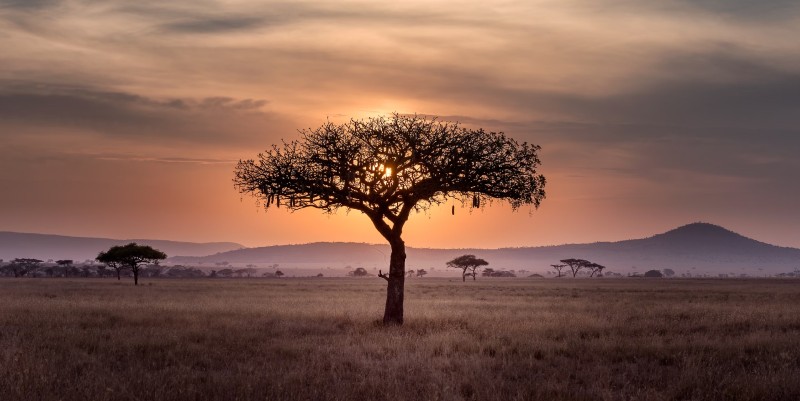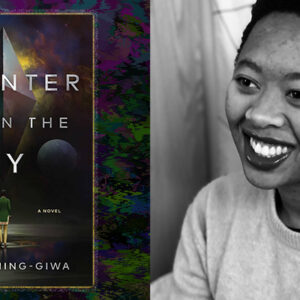Tanzania in East Africa has a complicated history. Sitting there on the Indian Ocean bordering Uganda, Kenya, Mozambique, Malawi, Zambia, Rwanda, Burundi, and the Democratic Republic of Congo (DRC) – that’s a lot of neighbours. Once part of German East Africa, then ruled over by the British as Tanganyika (first as a League of Nations mandate and then as a United Nations trust territory until the 1960s and independence as Tanzania. You’d be forgiven for thinking the capital is Dar es Salaam, “Dar” to those that know it, right there on the coast. And Dar is the financial capital and most populous city of the country with six million people (out of a total population of over 60 million). But since the mid-1970s the capital has actually been Dodoma, with just 400,000 people. So in this Crime and the City we’re looking at all crime writing across the country.
You might not expect Regency romance and detective fiction writer Georgette Heyer to be included in Crime and the City Tanzania, but she qualifies. Heyer married a mining engineer and they lived in the old Tanganyika for several years in the 1920s. Apparently they lived deep in the bush where her husband was surveying for minerals. She wrote a couple historical romances while there and tells Tanganyika tales in her memoir but didn’t really get into detective fiction for another decade with her series of books featuring Superintendent Hannasyde and Sergeant (later Inspector) Hemingway. There are some criminal elements in Beauvallet (1929), a novel of Elizabethan pirates that she started work on while in Africa.
As far as I know Jean Scholey only wrote one crime novel – The Dead Past (1961) – but it happens to take place in colonial Tanganyika, and it is assumed (though little is known of the author) that Scholey was living there as a colonialist. The book features a murder investigation led by District Commissioner Geoffrey Hallden. The Saturday Review critic, back in the 60s, explains why The Dead Past might be worthy of a mention here, “setting is beautifully authentic … story is rather weak”. And they were right – there are lots of local insights – pombe shops and the local Indian community. An African policeman assists Hallden, a bit of Swahili is thrown in for good measure. It’s the rainy season, the police in Dar es Salaam cannot get to the murder site in Kilimani and so the colonial District Commissioner is the best they’ve got. A historical curiosity perhaps, but an apparently fairly faithful rendering of rural Tanzania at the time from a colonial perspective.
The writer PA Roberts, author of White Kings Corrupt Asians in Tanganyika (2016), apparently grew up in Nairobi and Dar es Salaam in the decades just before independence. It’s an historical crime novel set in the colonial era with Ray Silcock, police chief of Tanganyika on the trail of corrupt cops, missing Indian diamonds and an illicit affair with the governor’s wife.
And Chris Bohjalian, of The Flight Attendant (2018) fame, has been back to colonial Tanzania too – at least on the page. The Lioness (2022) sees a Hollywood actress, her producer husband and a bunch of A-listers holidaying in the Serengeti with a few G&Ts and some gazelle meat on the BBQ. Then a kidnapping gone wrong, some Russian mercenaries and a whole of trouble in Tanganyika. Bohjalian has written that he researched the book on a safari in the Serengeti in December 2019 and that, writing during covid, ‘the Serengeti fifty years ago helped keep me sane when I was alone in my library in Vermont.’
And some other crime novels set in Tanzania…
- Mario Bolduc’s Max O’Brien mystery series heads to Tanzania in The Tanzania Conspiracy (2018). Following the murder of Tanzanian lawyer and ex-lover Valéria Michieka and her daughter Sophie, Max O’Brien travels to Tanzania to track down those responsible. There he finds human traffickers and endangered lawyers. This is the third of three Max O’Brien novels, originally published in French by the Montreal-born writer Bolduc.
- Cape Town writer Irma Venter has launched the “Rogue” book series set in Tanzania and originally written in Afrikaans. Hard Rain (2020) is the first with journalist Alex Derksen’s starting his new assignment in Tanzania. an IT billionaire washes up onshore after seasonal flooding and Ranna, a beautiful photographer Alex knows, is the prime suspect. Book two in the series is Man Down (2021), again featuring Derkson and Ranna, moves the action to South Africa.
- And fans of Clive Custler will not be surprised to know that he has also spent some time in Tanzania in Lost Empire (2012) featuring his popular husband-and-wife treasure-hunting team Sam and Remi Fargo. This time scuba diving off the Tanzanian coast, discovering a former Confederate ship that sank off the African coast, and whose contents is claimed by the Mexican government somehow uncovering a conspiracy that connects the 1883 Krakatoa explosion with an attempt to resurrect the fallen Aztec empire. Really for fans of Custler’s oeuvre only to be honest.
Sometimes in this column it is hard to find local crime writers who’ve been translated into English. Asking around just about everyone mentions Ben Mtobwa, who has written a series of popular detective novels featuring detective Joram Kiango. But they’re in Swahili and the books are yet to find a translator. Similar so (I believe) the Zanzibar writer MS Abdulla who published six detective novels between the mid-1960s and mid-1980s featuring a kind of Tanzanian Sherlock Homes, Bwana Mesa, complete with smoking pipe and deductive skills. One can only hope for translators and publishers to discover these writers.
Still, we do have S Ndunguru, a Tanzanian author of Young Adult mystery and detective books published by Mkuki na Nyota Publishers, a book company founded in 1981 in response to a general absence of independent scholarly publishing in Tanzania. Spared (2015) introduces two Tanzanian officials, Tom and Chris, heading to Sweden. While there Linda, daughter of a Swedish billionaire, and Tom’s friend, is abducted. Much action involving snipers, lots of money and power and some thrilling set pieces. In Divine Providence (2012), a world-renowned scientist is saved from drowning by a young doctor before the same scientist is saved from kidnappers by the daring action of a young nurse. In A Wreath for Fr. Mayer (2016), Ndunguru introduces us to the Tanzanian district of Masasi where a cholera epidemic and a murder see a local priest determined to get to the bottom of it all.
And finally, we started with a writer, Georgette Heyer, you might never had associated with Tanzania, and we end with another, more contemporary one, Ann Cleves. Best known for the rugged northeast English coast in her Vera Stanhope novels or the island of Shetland in her Jimmy Perez series, Cleeves went to Tanzania for her 40th wedding anniversary. Out of that trip to the Serengeti came a short story – Moses and The Locked Tent Mystery included in the collection Ten Year Stretch: Celebrating a Decade of Crime Fiction at Crimefest (edited by Crimereads regular Martin Edwards, 2018).
In this column we focus on crime but it’s worth mentioning that while we have only a couple of local author mentioned here Tanzania has no shortage of writing talent. Tanzanian novelist Abdulrazak Gurnah won the 2021 Nobel Prize in Literature – and a tradition of crime novels, often incorporating local beliefs and traditions, but sadly very little in translation. Aside from crime, the novels of Gurnah are well worth reading, as are those of Tanzania-raised author M G Vassanji, particularly Uhuru Street (19910, collection of stories set in the Asian community of Dar es Salaam, and the often simultaneously hilarious and poignant short stories of Sandra Aikaruwa Mushi in her collection Stains on my Khanga (2014).

















